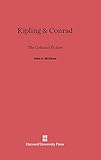Kipling and Conrad : The Colonial Fiction / John A. McClure.
Material type: TextPublisher: Cambridge, MA : Harvard University Press, [2013]Copyright date: ©1981Edition: Reprint 2014Description: 1 online resource (182 p.)Content type:
TextPublisher: Cambridge, MA : Harvard University Press, [2013]Copyright date: ©1981Edition: Reprint 2014Description: 1 online resource (182 p.)Content type: - 9780674428621
- 9780674428638
- Colonies in literature
- Engels
- Englische Literatur
- Fictie
- Imperialism in literature
- Kolonialisme
- Political fiction, English
- Colonies in literature
- Conrad, Joseph, 1857-1924 -- Criticism and interpretation
- English fiction -- History and criticism
- Imperialism in literature
- Kipling, Rudyard, 1865-1936 -- Criticism and interpretation
- LITERARY CRITICISM / General
- 823/.912
- online - DeGruyter
| Item type | Current library | Call number | URL | Status | Notes | Barcode | |
|---|---|---|---|---|---|---|---|
 eBook
eBook
|
Biblioteca "Angelicum" Pont. Univ. S.Tommaso d'Aquino Nuvola online | online - DeGruyter (Browse shelf(Opens below)) | Online access | Not for loan (Accesso limitato) | Accesso per gli utenti autorizzati / Access for authorized users | (dgr)9780674428638 |
Browsing Biblioteca "Angelicum" Pont. Univ. S.Tommaso d'Aquino shelves, Shelving location: Nuvola online Close shelf browser (Hides shelf browser)

|

|

|

|

|

|

|
||
| online - DeGruyter The Challenge to American Foreign Policy / | online - DeGruyter George Eliot and the Novel of Vocation / | online - DeGruyter The Dangerous Class : Crime and Poverty in Columbus, Ohio, 1860–1885 / | online - DeGruyter Kipling and Conrad : The Colonial Fiction / | online - DeGruyter Dangerous Offenders : The Elusive Target of Justice / | online - DeGruyter Terror and Progress—USSR : Some Sources of Change and Stability in the Soviet Dictatorship / | online - DeGruyter In Quest of Virgil’s Birthplace / |
Frontmatter -- ACKNOWLEDGMENTS -- CONTENTS -- INTRODUCTION -- 1. KIPLING’S EMPIRE -- 2. UNBEARABLE BURDENS: KIPLING IN THE EIGHTIES -- 3. LIFTING THE BURDEN: KIPLING IN THE NINETIES -- 4. JOSEPH CONRAD: BOUND TO EMPIRE -- 5. THE MALAY NOVELS: IMPERIAL ROMANCE AND REALITY -- 6. THE HEART OF DARKNESS -- 7. NOSTROMO: TYRANNY WITHOUT TYRANTS -- CONCLUSION -- NOTES -- INDEX
restricted access online access with authorization star
http://purl.org/coar/access_right/c_16ec
In this skillfully written essay on the fiction of imperialism, John McClure portrays the colonialist--his nature, aspirations, and frustrations--as perceived by Kipling and Conrad. And he relates these perceptions to the world and experiences of both writers. In the stories of the 1880s, McClure shows, Kipling focuses with bitter sympathy on "the white man's burden" in India, the strains produced by early exile, ignorance of India, and the interference of liberal bureaucrats in the business of rule. Later works, including The Jungle Book and Kim, present proposals for imperial education intended to eliminate these strains. Conrad also explores the strains of colonial life, but from a perspective antithetical in many respects to Kipling's. In the Lingard novels and Lord Jim he challenges the imperial image of the colonialist as a wise, benign father protecting his savage dependents. The pessimistic assessment of the colonialist's motives and achievements developed in these works finds full expression, McClure suggests, in Heart of Darkness. And in Nostromo Conrad explores the human dimensions of large-scale capitalist intervention in the colonial world,, finding once again no cause to celebrate imperialism. John McClure's interpretation is forceful but ever attuned to the complexities of the texts discussed.
Mode of access: Internet via World Wide Web.
In English.
Description based on online resource; title from PDF title page (publisher's Web site, viewed 24. Aug 2021)


